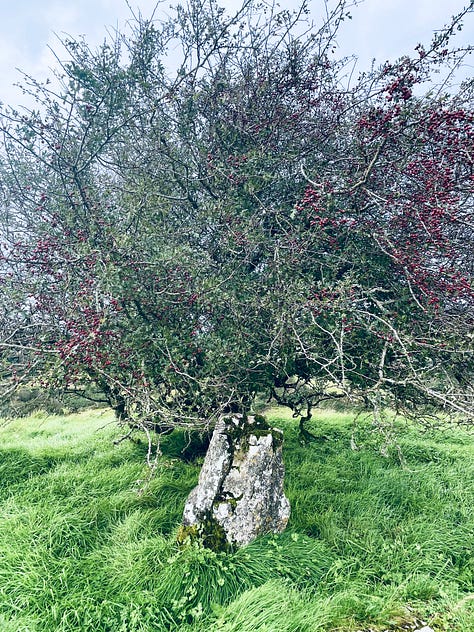If you had been walking along the River Moy this week where it meets the sea in Ballina, you might have seen me and my husband hugging a few trees. It’s our latest hobby - a kind of dendrochronology, but while the tree is still standing.
We can be found with arms extended around tree trunks, counting how many arm spans it takes to embrace the entire trunk. Then, we apply some basic calculations (tree diameter x growth factor = tree age) and pronounce our specimens ‘ancient’. It’s very scientific and also very rock and roll. You can just imagine the eye-rolls this kind of behaviour elicits from our children.
There is a sycamore on the edge of the woodland that is over 250 years old. In sycamore terms, it could rage on for another 200, but this one is dying. This phase, where it is still very much tree, but beginning to look rough around the edges, is called twilight. It has lowered one large limb toward the ground, like an old woman propped up by her walking stick; its bark is peeling off and recent storms decimated its crown. Still, it will most likely stand there, dying, for many years to come.
It’s really hard to watch things die.
I keep company with trees at times like these because they have seen it all before. If I were to take a slice of that sycamore, I could find the year that the potatoes got blight and we lost a quarter of the Irish population, or the ‘night of the big wind’, or the heavy snowfall of 1917. We could mark all the wars, times of political upheaval, infectious disease outbreaks and the year the last wolf was killed on this land. The highs and lows of the last two centuries could be charted on the rings of that tree, and, by the time it falls, it may have overseen the guts of whatever comes next for us.

When we are stricken
This ancient sycamore reminded me of a beautiful passage by Hermann Hesse from his 1920 collection of fragments, Wandering: Notes and Sketches.
‘When we are stricken and cannot bear our lives any longer, then a tree has something to say to us: Be still! Be still! Look at me! Life is not easy, life is not difficult. Those are childish thoughts. . . Trees have long thoughts, long-breathing and restful, just as they have longer lives than ours. They are wiser than we are… When we have learned how to listen to trees, then the brevity and the quickness and the childlike hastiness of our thoughts achieve an incomparable joy.’
Writers’ Hour Competition
I took notes during a recent vigil with my hawthorn neighbours on the hill above our house. They are loosely inspired by Seamus Heaney’s poem The Haw Lantern, and my piece won first prize in the London Writers’ Salon Writers’ Hour competition this week. You can read it in their magazine here, or below:



A Small Light
I have carried your thorn in my pocket for a week. It is the length of my finger, with four tight buds and bark like a grandmother’s skin. There is a tiny scar on the branch from which it came; no-one would notice unless they knew you well, unless they studied your sharp profile against the ever changing sky. To carry your thorn is to hold the tension between wound and healing; you are all the medicine I need.
I lie here, in circle with your kin, and I am enchanted. Bees visit the yarrow and field scabious beside me, mushrooms nose the soft wet earth and your berries glow like a lantern in the dawn. If I were to pull back the covers, this thick layer of grass and sheep sorrel, I would see the cashel remains, the huge boulders holding my ancestor’s bones, and the place of ceremony over which you presided for centuries. If I dug deeper, I would trace your roots like a map to the place where your sisters grow strong. Who planted you in a ring like this? What did they know that I do not? Deeper still and I’d reach the heart of the hill, where water has carved a space through the limestone. Can you hear it whisper as it flows from the mountain of the sleeping giant to the lake beyond?
I come aground. Your branches are whipped by the prevailing wind to resemble a creature reaching. You pine for something west of here, across the circle, beyond your grasp. I follow your line of sight to the ocean where ships once set sail for Quebec loaded with starving people, and ships once set sail for England loaded with all our food. Beyond that, Maeve’s tomb is all rubble heaped on Knocknarea - do you yearn for our wild, warrior Queen? It is more likely you miss the forests that once stretched between here and there, your clan felled before your eyes.
Sunlight filters through your crown and the lichen flares, radioactive on your skeleton, an ancient reminder of our source. Now that you are bare, I see the nest you cradled. I guess blackbird or bullfinch, and marvel that in all my hours of observation, I failed to notice this miracle.
The light reaches me and I am beheld: a scrap of muscle and bone stretched out on a blanket, here today, gone tomorrow.
Yet I, too, burn.
In the context of your thickening trunk, your tangle of branch, the May flowers, these ripe berries, my life is the thorn: quick, needle-thin, then plucked for the pocket of the next brokenhearted.
Teach me, therefore, how to be here, how to belong, like hawthorn on a hill.





Stunning words, Hawthorn is my favourite, my season marker. I loved this so much x
A beautiful piece. It feels like a conversation between friends, which you clearly are, you and the Hawthorn. Such a joy to read, as always xo